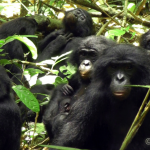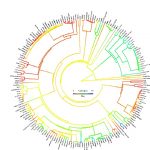Research in our lab focuses on the evolution and ecology of social behavior in humans and our closest living relatives.
We currently have several on-going projects:
|
|
Cooperation among the Tsimane’ of Bolivia
As part of an on-going collaboration with the Tsimane’ Health and Life History Project, we study the function and hormonal bases of cooperation among the indigenous Tsimane’ of the Bolivian Amazon. Furthermore, we are interested in how differences in socio-ecology – ranging from relatively isolated, egalitarian communities to more market-integrated, hierarchical ones – impact cooperation strategies and health outcomes. |
 |
Cooperation among female bonobos at LuiKotale, DRC
Led by postdoc Liza Moscovice and in collaboration with LuiKotale directors Barbara Fruth and Gottfried Hohmann, we are investigating the function and hormonal bases of cooperation among female bonobos, both within and between communities. This project is funded by the Leakey Foundation. |
 |
Comparative approaches to the evolution and ecology of behavior
Identifying consistent patterns in behavior – across species or populations – and the associated socio-ecological factors can provide powerful tests of adaptive hypotheses. To this end we cultivate strengths in modern phylogenetic methods and use them to complement our empirical field work. Recent comparative studies include the evolution of food sharing in primates, meta-analyses of reciprocity in food sharing among humans and other primates and the link between men’s status and fitness, a comparative perspective on human grooming, and a phylogenetic re-analysis of polygyny in the Standard Cross-Cultural Sample, led by Master’s student Riana Minocher. |
